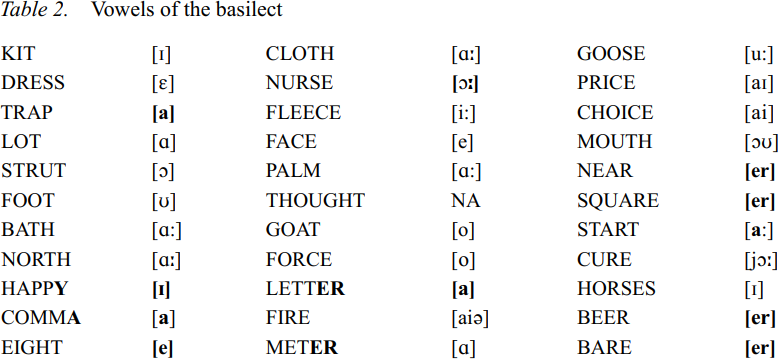


 Grammar
Grammar
 Tenses
Tenses
 Present
Present
 Past
Past
 Future
Future
 Parts Of Speech
Parts Of Speech
 Nouns
Nouns
 Verbs
Verbs
 Adverbs
Adverbs
 Adjectives
Adjectives
 Pronouns
Pronouns
 Pre Position
Pre Position
 Preposition by function
Preposition by function 
 Preposition by construction
Preposition by construction
 Conjunctions
Conjunctions
 Interjections
Interjections
 Grammar Rules
Grammar Rules
 Linguistics
Linguistics
 Semantics
Semantics
 Pragmatics
Pragmatics
 Reading Comprehension
Reading Comprehension|
Read More
Date: 2024-03-22
Date: 16-4-2022
Date: 2024-04-29
|
A number of vowel sounds are particular to Tobagonian and occur mostly in the basilect in the shortest words and in function words. Where the basilect and the mesolect share a pronunciation it is usually on distinctive content words.
The table of words, which displays acrolectal and mesolectal vowels, is presented below in table 2 but it should be noted that the basilect variants are not consistently produced in the reading of a Standard English text or word list. The variety in question is not used for reading purposes and informants necessarily shift varieties in reading.

Major vowel oppositions according to variety and territory include the following: Tobago’s basilect retains [a:] for Trinidad’s [ɔ>ɔ:] cloth, lot, north.
Also characteristic are [o], e.g. force, for Trinidad’s [ɔ:] and [ai] e.g choice for Trinidad’s [ɔi].
Among consonants the occurrence of [ʔ] word-initially for general English [h] is prevalent.
[a] is the most frequently occurring Tobagonian vowel. It is used in a vast number of words where the vowel sounds [æ], [ə] , and [ɒ] would be used in British English.
Table 3 below, adapted from Youssef and James 2002, gives examples of words it is used in as compared to corresponding words in Standard English.

In the first two categories of words, [a] is general Tobagonian but for the third it is purely basilectal; [a] gives way to [ɐ] in both mesolectal and acrolectal usage (though, for [ə] words, it may be retained). [a] is an unrounded sound while its mesolectal counterpart is rounded [ɐ]. Apparently because of this varietal distinction, [a] is, to an extent, socially stigmatized.
There are two diphthongs that occur particularly in certain word types in basilectal speech; these are [ai] (e.g. bwai> ‘boy’, spwail> ‘spoil’), and their counterparts in mesolectal speech are respectively [oi] and [ai]. [ei] is associated particularly with the towns of Charlotteville and Speyside in the eastern part of Tobago and with Bethel and Plymouth in the west.
There are two single vowels in all varieties that seem to be reduced monophthongal versions of English diphthongs: [e:]/[e] (<[ei]), and [o:] (< [əʊ] ). BrE /æ/ is lowered to /a/.
The single vowel [e:] in function words in basilectal speech seems to be a reduction of both of the diphthongs [iə] and [eə] , while [(y)i] is its mesolectal and acrolectal counterpart which is shared with Trinidad.
[o] represents a reduction of the diphthong [ow] in basilectal, but not mesolectal or acrolectal, speech. As example we find ho > ‘how’.
Because Tobagonian speech involves an interaction of three varieties which share the same general lexicon, it is impossible to totally separate basilect or mesolect, and so it would be difficult to specify all the vowels that occur in basilectal speech.
The short vowels that occur most in function words in basilectal speech are the nasal vowels (ĩ, ữ, õ and ã ) and oral [a]. The long vowels that occur most in basilectal speech are nasal [ã:] and oral [a:], [õ:] , and [ẽ:]. Examples of all these sounds are given in the following:
[ĩ]e.g di (remote past marker, reduced form of did e.g. he di go)
[ã] e.g. an (shortened form of and)
[ữ] e.g. kữ (reduced form of couldn’t)
[õ] e.g. [dõ] (a reduced form of don’t)
[ã:] e.g. [wã:] (a reduced form of wan ‘one’)
A striking feature of fast basilectal speech is the lengthening of the single vowels [a], [o], and [i] in association with pronoun subjects or the negator no; these are full words that end in a short vowel, which is then incorporated in the lengthened vowel. These vowels at the same time represent words. /a/ is both a copula and an imperfective marker; /o/is a future marker that has lost its onset g (go > o); and /i/ is the remote past marker that has lost both its onset /b-/ and its coda /-n/ (bin > i).
|
|
|
|
علامات بسيطة في جسدك قد تنذر بمرض "قاتل"
|
|
|
|
|
|
|
أول صور ثلاثية الأبعاد للغدة الزعترية البشرية
|
|
|
|
|
|
|
قسم الشؤون الفكرية والثقافية يجري اختبارات مسابقة حفظ دعاء أهل الثغور
|
|
|